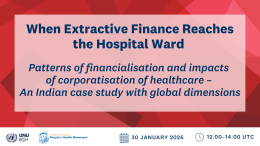Human trafficking is both illegal and big business. The International Labour Organization estimates that forced labour, one of the forms of exploitation into which humans are trafficked, generates $150 billion a year in revenues, while the Global Slavery Index suggests there may be as many as 45.8 million people enslaved today. Most of the victims are women and girls. The funds generated by human trafficking are proceeds of crime. Handling those funds can constitute money laundering or, in certain cases where designated terrorist organizations are involved, terrorist financing.
Financial institutions that handle funds generated by human trafficking and modern slavery, or that finance businesses that engage in these crimes, thus risk violating a range of existing laws and norms, especially in the area of anti-money laundering (AML) and countering the financing of terrorism (CFT).
To help industry actors and regulators think through their options for disrupting ties between the financial sector and human trafficking and modern slavery, UN University convened a workshop at Grace Farms in New Canaan, Connecticut, with the support of the Permanent Mission of Liechtenstein to the United Nations. Participants identified three main areas for action: strengthening sectoral knowledge uptake; improving regulation and encouraging leadership; and promoting information partnerships.
Access the Conference Proceeding Paper here.



